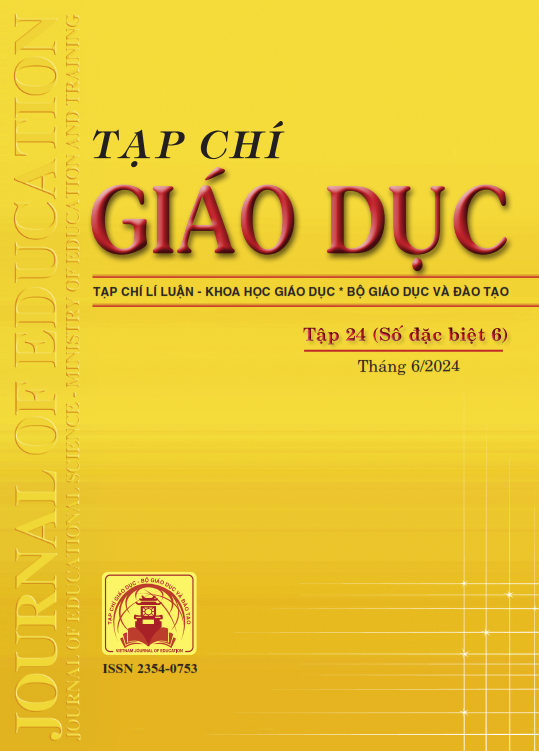Phát triển năng lực số cho người học dựa trên lí thuyết học tập kiến tạo với sự hỗ trợ của Chatbot AI
Tóm tắt
In order to ensure the educational goals of the 21st century, creating a “learning society” with “digital citizens,” the development of digital competencies for citizens in general and for learners in particular is a great concern of departments when discussing digital transformation. The study clarifies what digital competency is and how constructive learning theory plays a role in developing digital competencies, thereby proposing a process to develop digital competencies for learners based on constructive learning theory with the support of an AI chatbot through the teaching process. The steps in the process create a sense of unity, creating favorable conditions for both teachers and learners. Constructivist teaching theory has shown that teachers need to create a learning environment that helps learners build and create knowledge for themselves based on thinking, exploring, practicing, experiencing, and applying knowledge and technology in learning. AI chatbot technology acts as an effective tool in building virtual learning environments, virtual assistants, practice facilities, and virtual experiences that allow learners to interact, create, and work 24/7 anywhere. This approach supports the development of digital competencies for learners to develop digital competencies in the learning process.
Tài liệu tham khảo
Bernd Meier, Nguyen Van Cuong (2016). Modern teaching theory - Basis for innovating goals, content and teaching methods. University of Pedagogy Publishing House.
Blayone, T. (2018). Reexamining digital-learning readiness in higher education: Positioning digital competencies as key factors and a profile application as a readiness tool. International Journal on E-Learning: Corporate, Government, Healthcare, and Higher Education, 17(4), 425-451.
Cazco, G. H. O., González, M. C., Abad, F. M., Altamirano, J. E. D., & Mazón, M. E. S. (2016, November). Determining factors in acceptance of ICT by the university faculty in their teaching practice. In Proceedings of the fourth international conference on technological ecosystems for enhancing Multiculturality (pp. 139-146).
Chan, B. S. K., Churchill, D., & Chiu, T. K. F. (2017). Digital Literacy Learning In Higher Education Through Digital Storytelling Approach. In Journal of International Education Research (JIER), 13(1), 1-16.
Crockett, K., Latham, A., & Whitton, N. (2017). On predicting learning styles in conversational intelligent tutoring systems using fuzzy decision trees. International Journal of Human-Computer Studies, 97, 98-115.
Đặng Thành Hưng (2012). Năng lực và giáo dục theo tiếp cận năng lực. Tạp chí Quản lí giáo dục, 43, 18-26.
Ferrari & Anuska (2013). Digital Competence in Practice: An Analysis of Frameworks. Joint Research Centre of the European Commission, 91. https://doi.org/10.2791/82116
Fidan, M., & Tuncel, M. (2019). Integrating augmented reality into problem based learning: The effects on achievement and attitude in physis education. Computer & Education, 142, 103635.
Florence, M., Brandy, S., & Claudia, F. (2020). Examining student perception of readiness for online learning: Importance and confidence. Online Learning Journal, 24(2), 38-58.
Gilster, P. (1997). Digital literacy. John Wiley.
Hồ Thị Hồng Cúc (2018). Một số vấn đề lí luận về đổi mới phương pháp dạy học các môn lí luận chính trị ở trường chính trị các tỉnh Đồng bằng sông Cửu Long theo hướng phát triển năng lực. Tạp chí Giáo dục, số đặc biệt tháng 9, 155-159.
Jonassen, D. (1999). Designing constructivist learning environments. In C. Reigeluth, (Ed.), Instructional-design theories and models: A new paradigm of instructional theory (pp. 215-239). University Park: Pennsylvania State University.
Kumar, R., & Ali, M. M. (2020). A review on chatbot design and implementation techniques. Int. J. Eng. Technol, 7(11), 2791-2800.
Nguyễn Như Ý, Nguyễn Văn Khang, Vũ Quang Hào, Phan Xuân Thành (2013). Đại từ điển Tiếng Việt. NXB Đại học Quốc Gia Thành phố Hồ Chí Minh.
Nguyen Tan Dat, Pascal Marquet (2018). Digital capabilities to meet social needs: international models and approaches in Vietnam. Ho Chi Minh City Journal of Social Sciences, 295(5), 24-38.
Nguyễn Thị Giang (2022). Đề xuất một số biện pháp phát triển “năng lực số” cho đội ngũ giáo viên trong bối cảnh Cách mạng công nghiệp 4.0. Tạp chí Giáo dục, 22(19), 25-28.
Roche, T. (2017). Assessing the role of digital literacy in English for academic purposes university pathway programs. Journal of Academic Language and Learning, 11(1), 71-87.
Sánchez-Caballé, A., Gisbert-Cervera, M., & Esteve-Mon, F. (2020). The digital competence of university students: a systematic literature review. Aloma, 38(1), 63-74.
Serhat Kurt (2021). Constructivist Learning Theory. https://educationaltechnology.net/constructivist-learning-theory/
Tang, C. M., & Chaw, L. Y. (2016). Digital literacy: A prerequisite for effective learning in a blended learning environment? Electronic Journal of E-Learning, 14(1), 54-65.
Trần Đức Hòa, Đỗ Văn Hùng (2021). Khung năng lực số cho học sinh Việt Nam trong bối cảnh chuyển đổi số. Tạp chí Thông tin và tư liệu, 1, 12-21.
Trần Khánh Đức (2022). Tư duy khoa học và phát triển năng lực tư duy khoa học trong giáo dục và đào tạo. NXB Đại học Quốc gia Hà Nội.
Trần Thị Ngọc Ánh, Nguyễn Thị Thảo Trang, Nguyễn Thị Thúy Hoài (2023). Đề xuất quy trình sử dụng công nghệ thực tế tăng cường (AR) trong dạy học chủ đề “Trái đất và bầu trời” (Khoa học tự nhiên 6). Tạp chí Giáo dục, 23(23), 24-29.
UNESCO (2018). A Global Framework of Reference on Digital Literacy. In Information Paper, 51(51), 1-146.
Vázquez-Cano, E., Mengual-Andrés, S., & López-Meneses, E. (2021). Chatbot to improve learning punctuation in Spanish and to enhance open and flexible learning environments. International Journal of Educational Technology in Higher Education, 18(1), 1-20.
Wailthare, S., Gaikwad, T., Khadse, K., & Dubey, P. (2018). Artificial intelligence based chat-bot. Artificial Intelligence, 5(03), 2305-2306.
Yu, T. (2018). Examining construct validity of the student online learning readiness (SOLR) instrument using confirmatory factor analysis. In Online Learning Journal, 22(4), 277-288.
Đã Xuất bản
Cách trích dẫn
Số
Chuyên mục
Giấy phép

Tác phẩm này được cấp phép theo Ghi nhận tác giả của Creative Commons Giấy phép quốc tế 4.0 .












